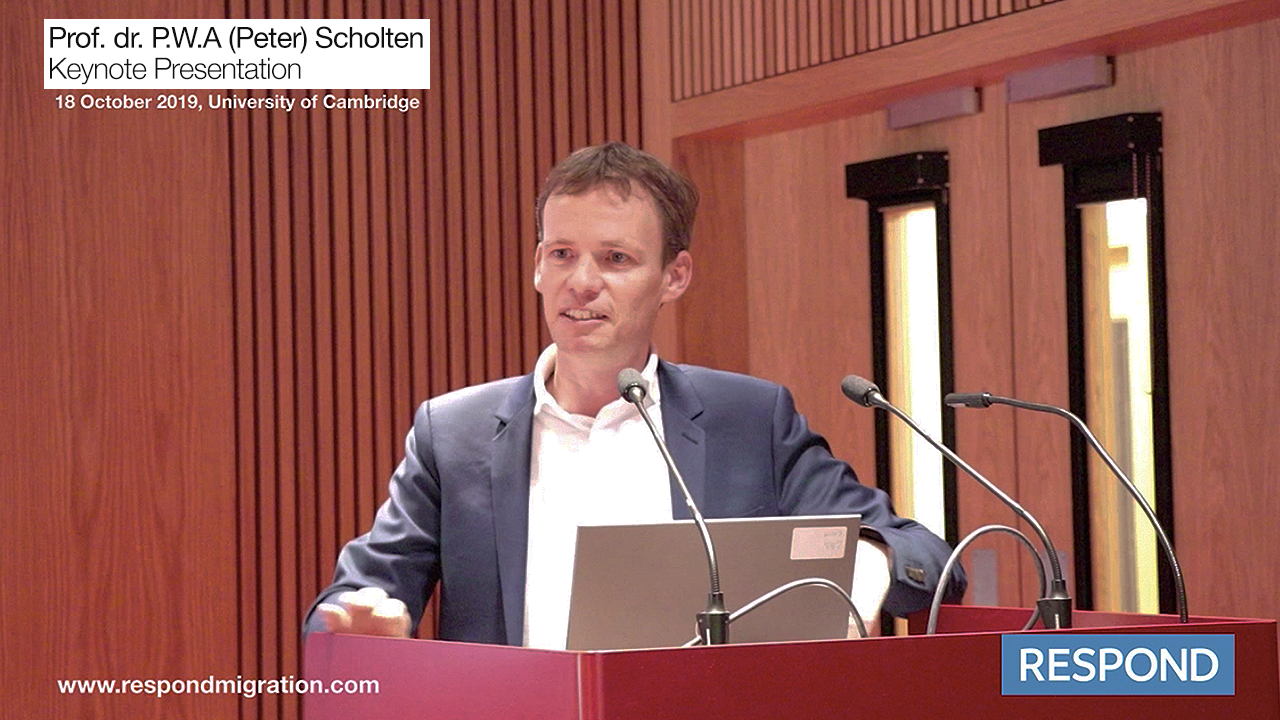RESPOND Conference: Unpacking the Challenges and Possibilities for Migration Governance
RESPOND CONFERENCE UNPACKING THE CHALLENGES AND POSSIBILITIES FOR MIGRATION GOVERNANCE was held from the 17th to the 19th of October, 2019 at Newnham College, UK
by Jonas Begemann, Leiden University
Almost a year after being an intern at RESPOND in Uppsala I got the opportunity to visit the project’s conference, which for me also was the first conference of this size to attend. What would expect me?
From the 17th to the 19th of October the RESPOND project – represented by the conference’s host and organisers Naures Atto (University of Cambridge), Susan Rottman (Özyegin University), Veronica Federico (University of Florence) and Soner Barthoma (Uppsala University) – welcomed 175 participants at the beautiful Newnham College in Cambridge.
In the past years, the RESPOND teams, spread all over Europe, published a vast number of research reports and papers within the project’s work packages. The conference in October now was a unique chance to bring together not only researchers from RESPOND but generally scholars engaged with migration studies from different academic backgrounds in a both highly focused and (from the perspective of a “conference-newbie”) comfortably open and relaxed atmosphere.
The project aims at – as the conference’s title nicely summarised – “Unpacking the Challenges and Possibilities for Migration Governance” (with particular interest in the so-called “refugee crisis” since 2015). In this spirit, ten panels (with 24 sessions) were structured around RESPOND’s work packages, among other topics dealing with border management, international refugee protection, “welcoming culture”, labour market integration, role of gender in integration processes, aspects of mental health, Europeanisation or local-level-experiences.
The participants had the chance to listen to 114 presentations – often enough, it was a tough choice between interesting yet parallel sessions! With the informed audience being so highly engaged in topics and discussions, all the time for discussion was often not enough to shed light on the many interesting aspects of the papers: talks on mafia influence on refugee centres in Italy, international cooperation, fieldwork in the borderlands of Europe and the middle-East or mental health aspects had to be postponed to the coffee breaks. The broad mix of disciplines, fields and perspectives reached from distinctly individual bottom-up perspectives (e.g. the cooperation between a scholar and a Syrian refugee, leading to a joint paper) via work from political scientists, anthropologists and philosophers to macro-level legal analyses. This was a highly stimulating experience that highlighted new points of view for surely every participant. Being high on the political agenda of policy-makers on European and national level, it came as no surprise that many presentations dealt with various aspects and consequences of border management or externalisation. This included coastguard cooperation in the Mediterranean, illegal pushbacks at the Hungarian border and cooperation between the EU or member-states and, for example, North-African states. Other presentations dealt with the EU-Turkey-deal, approaching it from different academic angles. In yet other panels, scholars presented their studies on the importance of religion for refugees or the best interest of migrant children in Northern Europe, Labour Market integration possibilities and problems or local-level specific studies.
Besides the inspiring panels, the four keynotes were definitively the highlights of the conference. They were delivered by reputable professors from very different backgrounds. Dawn Chatty, Emerita Professor of Anthropology and Forced Migration (University of Oxford) presented a post-imperial lens of mass forced migration. With the conference’s topic being rooted very much in the presence this lecture gave a welcoming historical backdrop to the study of mass migration. Peter Scholten, Professor for Public Administration at Rotterdam University and director of IMISCOE, presented the central concepts of his upcoming book, a complex (and complexity-interested) analysis of migration governance being focused on the problematisation of alienation and the call for mainstreaming. Mario Savino, Professor of Administrative Law at The Tuscia Univeristy addressed immigration law at the time of populism, a topic now relevant all over Europe. The last keynote was held by professor emeritus Halina Grzymała-Moszczyńska , Professor of Psychology of Religion, Jagiellonian University, Kraków. Her lecture on agency, trauma and resilience emphasised empathy and the importance of the individual’s agency. It was a very well chosen topic to end the the conference with.
Newnham College, being a wonderful mix of old college architecture with modern extensions, provided attendees from the professor to the student with perfect localities and organisation. Here, a very productive and relaxed atmosphere prevailed in which the audience, consisting of renowned professors, international scholars, PhD candidates and few students alike, interacted and participated. Many attendees (like the author of these lines) followed thematic “streams”, in my case the work grouped around border management. This group cohesion was acknowledged and esteemed by the panel chairs too, emphasising the intimate and informed atmosphere.
Discussion and new contacts were stimulated by joint lunch and social activities: A punting tour was on the programme as well as the screening of the documentary “Dog Years”, giving voice to activists on Lesbos who went to save the lives of refugees. For those who have no personal experience in the field at hotspots – in all its meanings – of the “refugee crisis” this was a special opportunity to get a more direct impression. At this point the awarded short documentary “The European Dream: Serbia” may be recommended. It connects directly to border practices and illegal pushbacks in Hungary as discussed in panel 2D. A method pub made teams of participants puzzling over thorny methodological questions while enjoying a cold beer: an excellent way to engage with each other and take home new inspirations.
As mentioned in the beginning, for me, this was the first time attending a conference of this size. Despite being somehow nervous initially and a troublesome journey it has been a fantastic experience with many new interesting contacts and impressions.




